c
| Fourth Quarter 2012 | story by MARK FAGAN | photos by STEVEN HERTZOG |
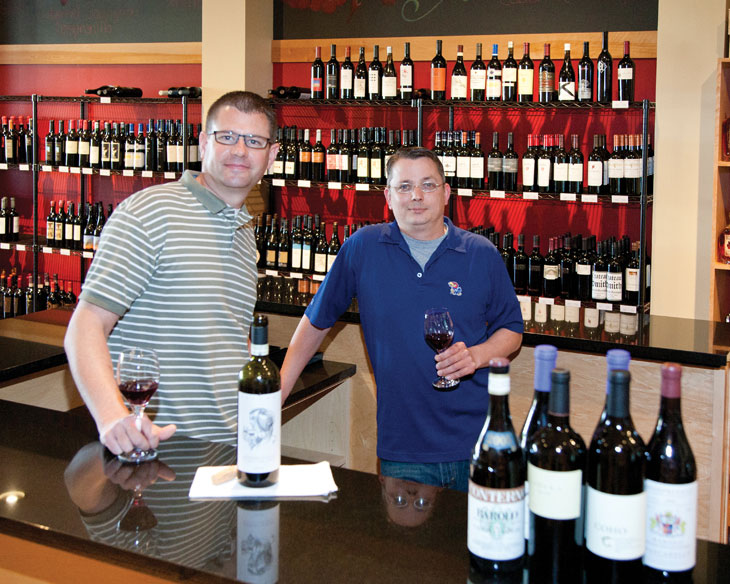
Stephan Prô could use a laptop, tablet or iPhone to pull up all the detailed information anyone could imagine about wineries, vineyards and varieties. He also could go electronic to buy bottles from California, France or most anywhere else grapes are aged into wine.
But the orthopedic surgeon prefers instead to venture into a bustling shop tucked into the corner of a strip center in northwest Lawrence. That’s where he finds two especially attentive wine merchants willing to share their experiences, enthusiasm and inventory with anyone showing an interest. Their complimentary wine tastings each Saturday afternoon merely confirm what Prô’s always known: Th e personal touch is always best.
“I don’t want to spend the time to research and check things out online to know what’s ‘good’ and what’s ‘not good,’ ” Prôsays as he peruses the wire shelves one Saturday at City Wine Market, swirling a glass of red said to pair well with turkey and other trimmings for Thanksgiving. “If it’s in their store, it’s good. And the knowledge these guys have is great, as well as the help they provide. You can’t go online and get that.”
Score one for the locals.
In a world where cost and convenience are feeding a growing market share through e-commerce — the National Retail Federation forecasts that more than half of Americans will shop online for the winter holidays, spending a record of up to $96 billion online — local merchants are doing what they’ve always done to survive and thrive: Adapt. Focus. Compete. Serve.
“I would argue that the one thing that local businesses can do is to provide service that can’t be outsourced,” says Steve Wilson, who runs City Wine Market with Jamie Routledge at 4821 W. Sixth St. “So the challenge is on us to provide better service than you’d get if you called an 800 number.”
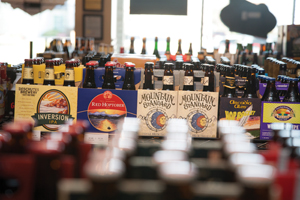 City Wine Market — with its knowledgeable staff, accessible prices and timely tasting events — isn’t the only merchant in town carving out a niche in an increasingly online economy
City Wine Market — with its knowledgeable staff, accessible prices and timely tasting events — isn’t the only merchant in town carving out a niche in an increasingly online economy
That’s welcome news for John Ross, chairman of the Lawrence Chamber of Commerce. He sees such community commerce as critical for preserving, protecting and promoting the services that make Lawrence the livable community that it is.
“When you generate local sales tax, it supports the local infrastructure we all have come to know and depend upon,” says Ross, whose organization champions the “Live It Local” campaign to raise awareness of such issues.
Buying consumer goods in town means pumping money into local government accounts used to finance an array of municipal projects and services: police and fire protection, parks and recreation projects and programs, road maintenance and upgrades and on and on.
Owners of local businesses, in turn, tend to spend their revenues locally, creating a churn of money that supports municipal services and allows the businesses to hire local workers, who also spend their money locally. And folks in local businesses, Ross notes, often are the ones out there volunteering with social service agencies, coaching youth sports teams and otherwise bolstering community-oriented programs that make a difference in everyone’s lives.
“When you’re buying local,” Ross says, “you’re supporting everything that we love.”
Ross is confident that local businesses can continue to meet the needs of local residents, even as online operations pose increased competition. Not that it’s easy. At his own business, Laser Logic, Ross had to make changes to prevent his complimentary network-consulting services from being used by others to buy products from online competitors. “It’s a challenge,” Ross says.
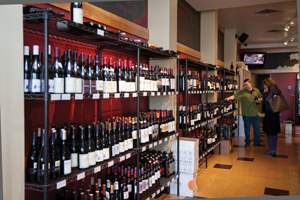 Jennifer and Matt Richards are up for it. When they opened their own shop, Made, in downtown Lawrence back in June 2011, they were careful to offer only unique gifts from local and regional providers, whose one-of-a-kind products and product lines present a contrast to mass-marketed items easily found online.
Jennifer and Matt Richards are up for it. When they opened their own shop, Made, in downtown Lawrence back in June 2011, they were careful to offer only unique gifts from local and regional providers, whose one-of-a-kind products and product lines present a contrast to mass-marketed items easily found online.
Made stocks glasses made from recycled beer and vodka bottles, and notebooks bound in scorecards from nearby golf courses. Hand towels, letterpress coasters and solid granite drink chillers share space with spices mixed, and pistachios flavored, by the folks at Nut Nation, just at the edge of Lawrence on the south side of Clinton Lake.
Like many small, independent shops, Made relies on limited inventories and close connections to stay above the online fray — even while dabbling in social media to build buzz and line up a few sales.
Jennifer Richards regularly posts photos of new items to the shop’s Facebook page, an account that eclipsed 1,000 “likes” just as the holiday shopping season began. The world’s largest social network allows her to let interested folks know when a shipment of, say, 10 leather credit card wallets hits the shelves.
Then she can take requests for setting particular ones aside for customers who promise to stop by after work, or perhaps seek other special arrangements.
“We can pull it and mail it,” she says, pointing to a space behind the counter for set-asides. “We do ship.”
Such customer service long has been in vogue at Weaver’s Department Store, a fixture in downtown Lawrence for more than 155 years.
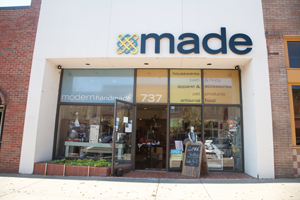 Joe Flannery, president of Weaver’s, acknowledges that online sales do cut into the store’s sales. But the business remains strong by doing what it does best: offering clothes, cosmetics, accessories, small appliances, gifts and everything else that customers expect, and doing so at competitive prices and with attentive and knowledgeable customer service.
Joe Flannery, president of Weaver’s, acknowledges that online sales do cut into the store’s sales. But the business remains strong by doing what it does best: offering clothes, cosmetics, accessories, small appliances, gifts and everything else that customers expect, and doing so at competitive prices and with attentive and knowledgeable customer service.
Weaver’s employs 50 people, in a combination of full and part time roles, and once again the store will provide what remains its signature holiday service: cheerful, complimentary gift wrapping.
The store even offers free delivery for customers in Lawrence. “We believe that customers still like to touch and feel the merchandise — to feel it,” Flannery says. “We try to make sure it’s convenient, with our personal service.”
Such familiar services aren’t going anywhere, but even a store that’s been around a year longer than Macy’s soon will be entering the digital age. Flannery plans to introduce online shopping at Weaver’s sometime in 2013 — not as a replacement for the personal touch, but instead as an extension of the connections already made inside the stalwart building at 901 Mass.
“We just want to make sure we do it right, and make it simple for the customer and for our order fulfillment,” Flannery says. “It’s all about relationships. When we do online, we still want to have those relationships.”
The city of Lawrence is counting on local merchants to build bricks-and-mortar success in the increasingly online economy, as municipal services continue to rely heavily on revenues from sales taxes to finance operations. Many online sales are not subject to taxation.
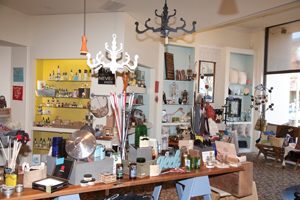 David Corliss, city manager, said that the city would continue to try to convince lawmakers to require that sales taxes be assessed on all online purchases, regardless of whether a particular merchant operates a physical presence in Lawrence or elsewhere in Kansas.
David Corliss, city manager, said that the city would continue to try to convince lawmakers to require that sales taxes be assessed on all online purchases, regardless of whether a particular merchant operates a physical presence in Lawrence or elsewhere in Kansas.
More online shopping means less money for basic services. “I have a budget that needs $30 million in sales taxes,” Corliss says, noting that buying from L.L. Bean doesn’t put fuel in the tanks of police cars, maintain equipment for parks or provide support for most other municipal services.
Flannery is confident that Lawrence shoppers will continue to spend money in town, money that helps the community offer the important protections, services and amenities that make it a special place. Sales taxes make a big difference, he says, but all businesses owned by Lawrence people also spend their money locally, which in turn helps other businesses and the people they employ.
“Lawrence people are very astute,” he says. “They know it makes a difference.”

68 Comments
I value the blog post.Thanks Again. Want more.
Hey, thanks for the blog article.Really looking forward to read more. Awesome.
Fantastic blog article.Really thank you!
Major thanks for the post.Thanks Again. Keep writing.
Thanks so much for the blog.Much thanks again.
Really informative article post.Much thanks again.
Very informative blog article. Keep writing.
Looking forward to reading more. Great post.Really thank you! Will read on…
I value the blog post.
Enjoyed every bit of your blog article.Really thank you! Really Great.
Thanks for sharing, this is a fantastic blog post. Awesome.
I think this is a real great blog.
Major thankies for the article. Keep writing.
I really like and appreciate your post.Really looking forward to read more. Fantastic.
https://snaptik.vip
I loved your article post.Really thank you! Great.
I really enjoy the article. Want more.
bookmarked!!, I love your website!
I truly appreciate this blog.Thanks Again. Keep writing.
Really enjoyed this article.Really thank you!
Hey, thanks for the article post.Thanks Again. Will read on…
I value the article post.Really looking forward to read more. Fantastic.
Muchos Gracias for your article post. Want more.
I loved your post.Thanks Again. Will read on…
This is one awesome article post. Want more.
wow, awesome blog.Really thank you! Great.
I truly appreciate this post.Really thank you! Will read on…
Very informative blog article.Really thank you! Really Cool.
Hey, thanks for the blog post.Really looking forward to read more. Awesome.
Thanks for sharing, this is a fantastic post.Really looking forward to read more. Awesome.
Very good blog.Much thanks again. Want more.
Im obliged for the article. Really Cool.
Hey, thanks for the post.Thanks Again.
Awesome article post.Really looking forward to read more. Will read on…
Thanks for the blog article.Thanks Again.
Really appreciate you sharing this blog article. Want more.
Thanks again for the post.Really looking forward to read more.
Im grateful for the blog article.Thanks Again. Awesome.
Very neat blog post. Will read on…
This is one awesome blog.Really looking forward to read more.
Thanks a lot for the article post.Really thank you! Will read on…
Wow, great post. Cool.
WOW just what I was looking for. Came here by searching for жаңалықтар Ethereum кеншілері
Wow, great article.Really thank you! Awesome.
Im obliged for the article.Really thank you!
I think this is a real great blog.Really thank you! Keep writing.
I really enjoy the blog article.Thanks Again. Keep writing.
Thanks a lot for the blog post.Much thanks again. Really Cool.
I value the article.Really thank you! Will read on…
Fantastic article.Really looking forward to read more. Cool.
I really liked your blog article.Thanks Again. Want more.
I really liked your article post.Thanks Again.
A round of applause for your post.Really looking forward to read more. Really Great.
I really like and appreciate your article. Awesome.
Fantastic article.Thanks Again. Want more.
I appreciate you sharing this blog post.Much thanks again. Keep writing.
Thanks for the article.Much thanks again.
Hey, thanks for the blog article.Really thank you! Keep writing.
I really like and appreciate your post.Really thank you! Want more.
Thanks so much for the article.Really thank you!
Say, you got a nice blog.Much thanks again. Awesome.
Great blog article.Thanks Again. Cool.
I really liked your article post.Really thank you! Keep writing.
A round of applause for your article post.Thanks Again. Cool.
Awesome article post.Much thanks again. Really Cool.
Fantastic article.Really thank you!
I appreciate you sharing this blog article.Really looking forward to read more. Will read on…
Fantastic post.Really looking forward to read more. Want more.